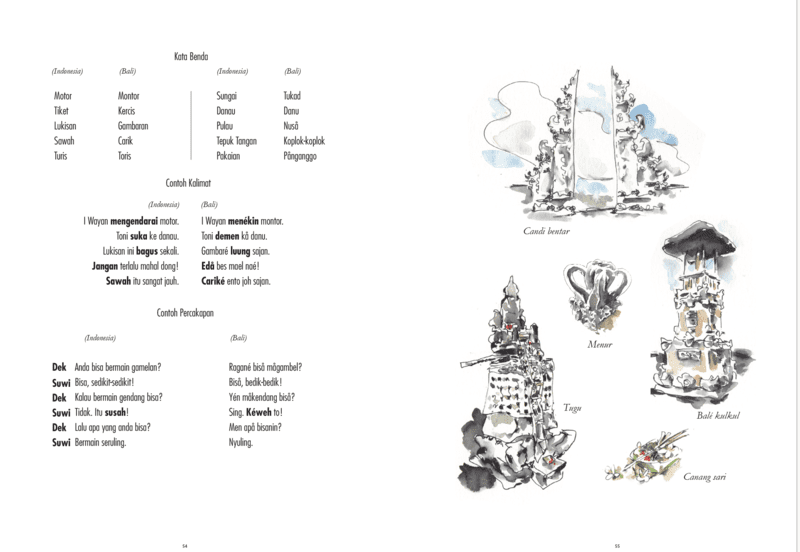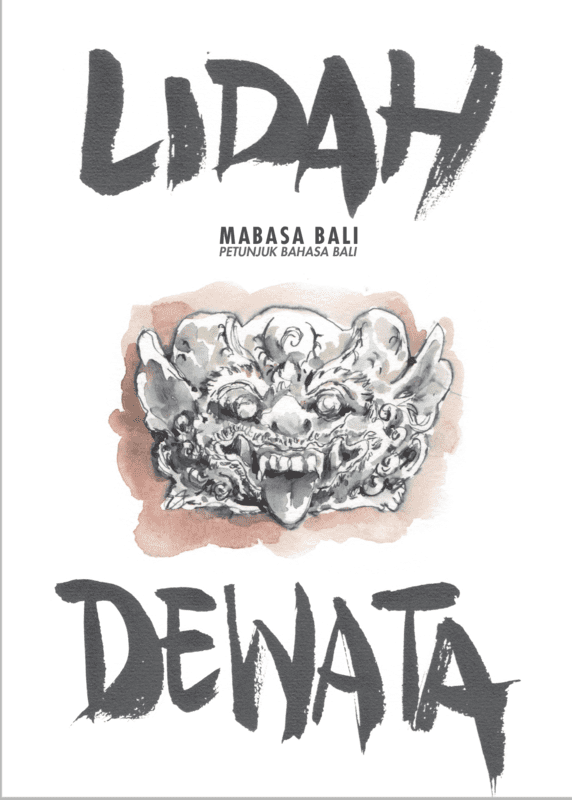Balinese or Basa Bali is becoming less relevant on an island continually influenced by modernity. With their new book, French artist Pascal Hierholz and Balinese scholar I Gde Agus Darma Putra wish to keep the language alive.
Is the Balinese language (also known as Basa Bali) disappearing?
Roughly, three levels exist: low, middle, and high. The last one is also divided into several categories, although local dialects are not explicitly mentioned. Depending on your caste and the person you are speaking to, you should or should not use a specific form. These layers are so complex that they no longer seamlessly fit into modern Bali. However, the language is simultaneously fading from some spaces while re-establishing itself in others. The ‘cargo cult’ effect has also influenced it. Indonesian (also known as Bahasa Indonesia) and other languages, instead of Balinese, have been spoken more frequently on the island due to tourism.
French artist Pascal Hierholz and Balinese scholar I Gde Agus Darma Putra have undertaken the task of teaching the Balinese language to foreign residents living on the island. They published a book introducing a straightforward method based on vernacular middle Balinese, titled Lidah Dewata. The only prerequisite is to first master basic Bahasa Indonesia, as they believe it is a lot easier to transition this way than directly from Western languages. Furthermore, the two authors aim to reintroduce the use of Balinese among the natives themselves.
For Hierholz and Putra, who previously translated the French-language Le Petit Prince into Balinese, their latest learning method book, Lidah Dewata, is aimed to make Balinese accessible to foreign residents on the island. Hierholz, married to a Bali native, initially attempted to learn Balinese upon arriving in Bali. Despite Hierholz’s talent for acquiring foreign languages (having lived in several countries), he found Balinese challenging. Ultimately, he switched to learning Indonesian for everyday communication.
Putra loved the idea, as well as the first step toward rebuilding confidence and interest in their own language among the Bali natives themselves. After all, with the dominance of Indonesian as the country’s official language, along with the widespread use of cool and empowering English, there was little room left for Balinese.
“Nowadays, The Bali natives often think in Indonesian, and when they speak Balinese, they tend to apply the grammar rules of the former while using Balinese words,” Putra explained. Hence, their method presented in Lidah Dewata is based on a blend of Indonesian and middle Balinese—a simpler approach that allows for effective communication across different caste positions.
Learning to Speak Middle Balinese
For Hierholz and Putra, Lidah Dewata serves as a way for foreign residents to express genuine interest in Balinese culture — by speaking the language in a ‘normal way.’ The keyword here is ‘connection.’
Why not create this connection between English and Balinese for a quicker understanding? Hierholz responded: “It’s not like in the 1930s when Walter Spies learned Balinese directly because the Malay language was spoken only by merchants. Nowadays, if you show even a slight interest in this country, you start with Indonesian. [However,] if you live in Bali, [you should] take a step further by learning to speak middle Balinese.”
Balinese is written in its own script, derived from Javanese and, ultimately, Sanskrit.
“This script doesn’t easily correspond to the Latin alphabet,” Putra elaborated; he also happens to be a specialist in aksara—the Balinese script. Adapting it to the Latin alphabet has been a decade-long topic of discord among scholars, to boot. Interestingly, Balinese phonemes exhibit even greater richness than those found in Bahasa Indonesia. However, according to Putra, opting for middle Balinese would invigorate language use because “nobody would be afraid to speak and make a mistake in terms of etiquette,” he remarked.
Why should expats in Bali consider buying Lidah Dewata?
“Well, if they live in Bali and are unable to speak Indonesian correctly, they are already at a disadvantage, and unfortunately, we can’t do much for them,” Hierholz and Putra answered. “However, if they want to deepen their understanding of the culture, learning the language for everyday conversation is undoubtedly the best way to broaden their knowledge.”
Lidah Dewata also provides insights into understanding Balinese script and how to read and pronounce it correctly. Putra actively refutes the idea that Balinese script is difficult for foreign minds, although he acknowledges its various levels of complexity. Hierholz, on the other hand, likens it to learning Chinese ideograms, ranging from basic to more sophisticated forms, emphasising that for everyday use, grasping it should not pose significant challenges.
A Nice Way to Show Your Curiosity About Bali
Nevertheless, the sad truth is that most foreigners living in Bali do not necessarily make the effort to learn Balinese. Thus, Lidah Dewata aims to encourage them to try.
“It’s a way of demonstrating respect for the island and its population, especially in a time when mass tourism has transformed everything here into another Ibiza,” Hierholz remarked. “Even if they don’t master the language perfectly using our learning method, it’s a nice way to show curiosity—an attitude that would be greatly appreciated locally.”
To conclude with the predominant ‘cargo cult’ effect in the Balinese society—where everything perceived as positive becomes integrated—we must delve into history. There has always been someone or something arriving from distant lands to spread new truths in Bali. Since the 1970s, tourists in search of paradise on Earth have disseminated English on the island, to the extent that some Balinese now say “matur tengkyu” instead of “matur suksema”. Additionally, we now encounter advertising billboards exclusively written in Russian at the crossroads in Bali. As the devastating effects of mass tourism on Bali persist, can we still view foreign influences as positive?
Making a small effort to speak middle Balinese and express interest in the culture would undoubtedly contribute positively, don’t you think?
The book Lidah Dewata is available to purchase in Bali at Ganesha Bookstore, Wartam, and Bosku. You can also purchase it directly from the authors by contacting the following number: +62 813-3914-9865.




